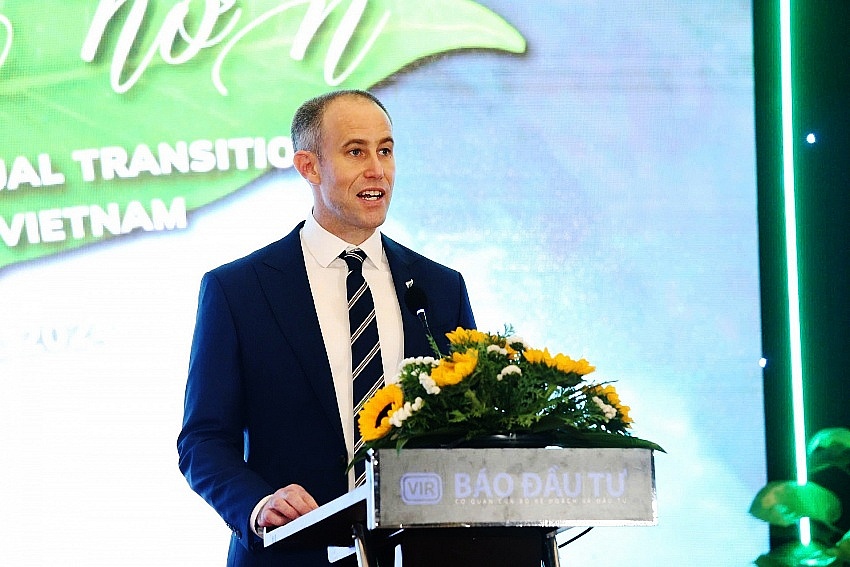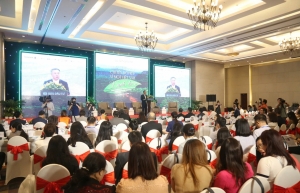New Zealand shares sustainable development experience with Vietnam
Speaking at a conference on sustainable development titled “Taking the Lead in Dual Transition for a Greener Vietnam” organised by VIR on November 12, Scott James, New Zealand’s Consul General and Trade Commissioner to Vietnam, shared New Zealand’s insights on green growth and sustainable development.
 |
| Scott James, New Zealand’s Consul General and Trade Commissioner to Vietnam |
“Sustainability is about safeguarding this environment for future generations while nurturing the growth of our industries and ensuring that our economic success does not come at the cost of the planet. This includes our agriculture industry, which has a significant impact on our emissions profile. By investing in research and technology, New Zealand is working towards more efficient, lower-emission farming practices, which aim to balance productivity with environmental responsibility.”
According to James, New Zealand's food and fibre industry is investing in technology to enhance traceability and transparency. Digital tools track products from farm to table, building consumer trust and promoting accountability for sustainable practices throughout the supply chain.
“New Zealand actively supports our businesses in making sustainability a core component of their export strategy and a key differentiator in the global market. This is particularly important given that over 85 per cent of New Zealand’s exports are directed to countries where environmental, social, and governance regulations are either in force or about to take effect, requiring companies to report on sustainable practices,” James continued.
In the renewable energy sector, which combines industry-oriented practices with natural resources like sunlight and wind, around 80 per cent of New Zealand’s electricity now comes from renewable sources, with hopes of reaching 100 per cent by 2030.
“New Zealand’s identity is closely tied to its landscape. From lush green hills to stunning beaches, the environment is not just a part of who we are, but also the core of our economy, culture, and lifestyle,” James stated.
Providing specific examples of domestic corporate actions, James highlighted the companies Boring Oat Milk, fruit and produce wholesaler T&G, and Zespri, the world’s largest kiwi producer.
With Boring Oat Milk, local supply chains are prioritised, and the company offers recyclable packaging solutions for customers. Producing one litre of oat milk requires 70 per cent less land and generates 93 per cent less greenhouse gas emissions than one litre of cow's milk. As dairy is a pillar of New Zealand’s economy, Boring is integrating oat production into the regenerative agriculture framework, providing a choice for consumers.
Meanwhile, key steps T&G is taking include fully eco-friendly and safe farming processes, using biodegradable labels, and cutting company emissions by 5 per cent.
While kiwi fruit is a low-impact crop, Zespri recognises the environmental effects from growing and transporting it to consumers. The company is leveraging new tools and technology to minimise environmental impact from growers to end consumers.
In addition to supporting domestic companies, New Zealand views sustainability as not only a responsibility but also a collaborative opportunity. By partnering with countries equally committed to a sustainable future, New Zealand hopes to create a world where innovation, resilience, and respect for nature coexist.
“New Zealand is committed to a vision of sustainability that reflects who we are. From government policy to industry practices, we are working to protect natural resources, promote social equity, and support community prosperity as we move towards our net-zero goal by 2050. For us, sustainability means creating a future where economic growth, environmental health, and social prosperity are intertwined and mutually reinforcing,” said James.
 | Taking the lead in dual transition for a greener Vietnam On November 12, VIR will host its annual sustainable development conference, with the presence of hundreds of leaders from ministries, international organisations, and domestic and foreign businesses pursuing digital and green transitions in Vietnam. |
 | VIR sustainable development conference opens in Hanoi VIR’s annual sustainable development conference, themed “Taking the Lead in Dual Transition for a Greener Vietnam,” opened at the Pullman Hanoi Hotel on November 12. The event brings together key stakeholders to explore innovative solutions for achieving Vietnam's dual transition of green and digital transformation. |
 | Vietnam on the verge of green industrial revolution At the first panel of VIR's sustainable development conference, experts highlighted the pressure facing Vietnam as the country enters a green industrial revolution. |
What the stars mean:
★ Poor ★ ★ Promising ★★★ Good ★★★★ Very good ★★★★★ Exceptional
Related Contents
Latest News
More News
- Vingroup consults on carbon credits for electric vehicle charging network (January 28, 2026 | 11:04)
- Bac Ai Pumped Storage Hydropower Plant to enter peak construction phase (January 27, 2026 | 08:00)
- ASEAN could scale up sustainable aviation fuel by 2050 (January 24, 2026 | 10:19)
- 64,000 hectares of sea allocated for offshore wind surveys (January 22, 2026 | 20:23)
- EVN secures financing for Quang Trach II LNG power plant (January 17, 2026 | 15:55)
- PC1 teams up with DENZAI on regional wind projects (January 16, 2026 | 21:18)
- Innovation and ESG practices drive green transition in the digital era (January 16, 2026 | 16:51)
- Bac Ai hydropower works stay on track despite holiday period (January 16, 2026 | 16:19)
- Fugro extends MoU with PTSC G&S to support offshore wind growth (January 14, 2026 | 15:59)
- Pacifico Energy starts commercial operations at Sunpro Wind Farm in Mekong Delta (January 12, 2026 | 14:01)

 Tag:
Tag:



















 Mobile Version
Mobile Version